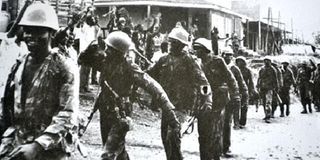Defence Council imposes curfew as enemies close in on Kampala

Tanzanian soldiers walk to Kampala after overthrowing Idi Amin in April 1979. The ouster was done jointly with Ugandan exiles. FILE PHOTO
What you need to know:
Final days. Monday, April 11, marked 37 years since the Tanzanian army and Uganda exiles toppled Idi Amin’s government. In the third part of our series, we return to one of the most turbulent times for Uganda.
In his last attempt to fight back the advancing enemy, former president Idi Amin imposed curfew. But it did not work.
The curfew was another non-military tool Amin used in an attempt to defeat the advancing Tanzanian army and the Kikosi-Maalum forces from Tanzania. This Amin did in the last week of March 1979, about a fortnight to the fall of Kampala on April 11, 1979.
The Front for National Salvation (Fronasa) led by Yoweri Museveni did not take part in battle for Kampala. From Mbarara, Fronasa went through western Uganda up to the Uganda/ DR Congo and Sudan border in West Nile sub-region.
As the war approached the Kampala environs, Amin fidgeted with security. Like a drowning man, he attempted to touch anything that could save him from running down the river. But the political river from Tanzania had a strong current that was too strong for him to survive. Indeed, he drowned in the river that swept him from Kampala to Libya and deposited him in Saudi Arabia.
Meanwhile, while still in State House, Amin had receive credible intelligence that that the invading forces from Tanzania had penetrated his intelligence system and were building on public support to continue the propaganda and psychological warfare against his regime.
To stop that, Amin decided to impose curfew to deter the movement of intelligence, propaganda material, enemy military equipment and or fighters into Kampala which was thought to be done at night.
On Sunday, March 25, 1979, a curfew was imposed on Ugandans, restricting them from moving at night. The curfew, according to the law, was to be observed by all people in Uganda. The dusk to dawn curfew was declared on March 25, 1979, by the Defence Council after a special meeting chaired by Gen Idi Amin in Entebbe.
The Defence Council was the supreme Executive and Legislative organ established after the January 25, 1971, coup that deposed president Milton Obote and installed Amin. The Defence Council issued three strict directives to all people living in the country to follow during the indefinite curfew. It was to start from 6pm to 6am daily until the Defence Council would announce any adjustment.
The directive stated in part: “People are warned that they should not use electric bulbs in full in their houses, except hospitals. And that must be with permission from the hospital. Any body found using full lights in their houses will be dealt with according to the law governing the curfew.”
Movement at night was only allowed for ambulances for emergencies and essential services needed by hospitals, but they had to first seek permission from the relevant authorities to permit the movement.
The Defence Council also warned anybody harbouring or assisting the enemy in a way. It similarly warned those avoiding passing at roadblocks that they would be treated as enemies of the State and would be dealt with severely.
The curfew also affected the aviation. The directive on this read: “From yesterday Sunday, March 25, 1979, old and new airports will be closed for international flights and Uganda’s airspace is also closed for international flights except those given permission in advance.”
The Defence Council also ordered the shooting down of any plane that came close to Uganda’s airspace. But interesting to note was that amid the war, Uganda Airlines continued flying to Britain though was not allowed to land at the Gatwick or Heathrow airports.
What was clear is that Uganda Airlines often took coffee, gold and what was known as the country’s best liquor, Uganda Waragi, to European cities. In return, the plane would bring expensive but essential goods such as furniture, wines, radios and watches that were largely sold at duty free shops as well as military shops at very low prices to soldiers. The soldiers would in turn smuggle the items and sell them to the public.
In fact, Uganda Airlines made the last flight from Britain to Entebbe in the first week of April 1979. And if the Tanzanian army had wanted, they would have shot down the Uganda Airlines plane at Entebbe airport from Mpigi area, which was in shooting range.
As the enemies advanced fast towards Kampala, Radio Uganda kept broadcasting news and special announcements issued by the Defence Council, assuring citizens that the Uganda Army was determined to defeat what was often referred to as the Zionist forces who had invaded the country from Tanzania.
Like the saying “the will to win if not converted to reality equals a loss,” while Amin had the desire to defeat the enemy, his army lacked the will to convert it into reality. And for that Uganda lost the war as Kampala fell on April 11, 1979. Although Amin had in September 1970 at a mosque in Kayunga said he feared no one but God, when time came to prove that he flew his family to Libya and then to Saudi Arabia where he died in exile in August 2003.
Read next week about Amin’s final day in Uganda




